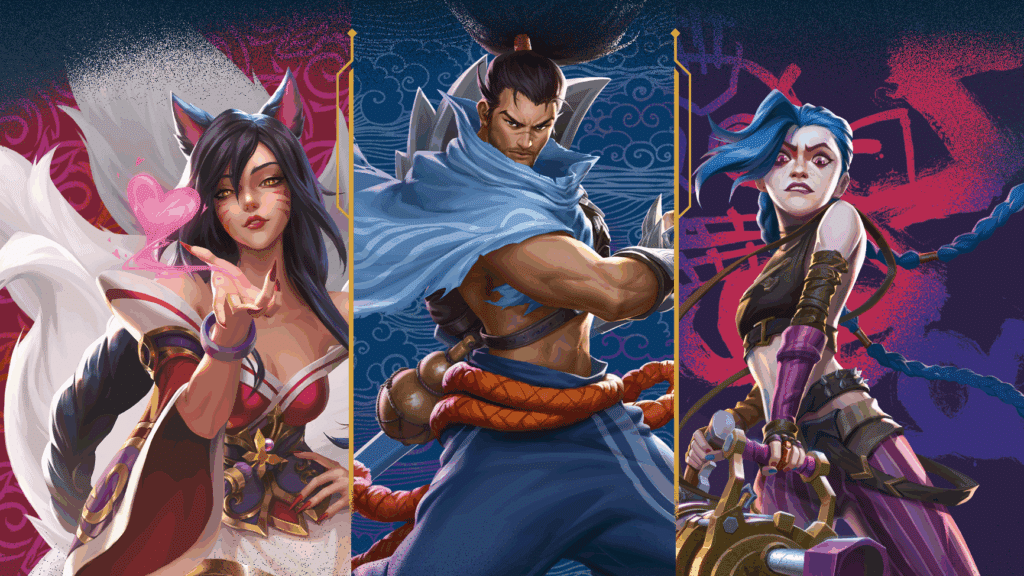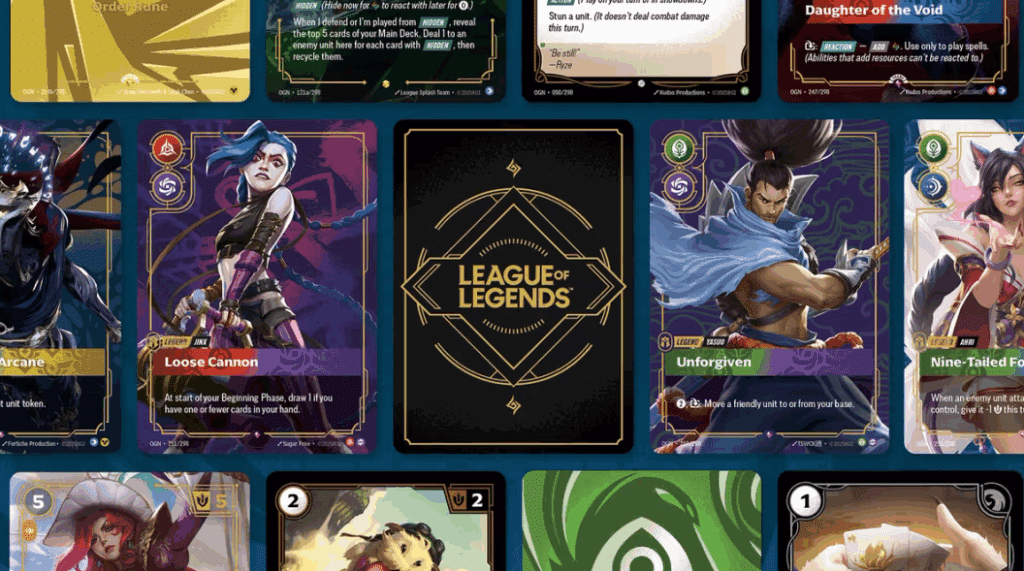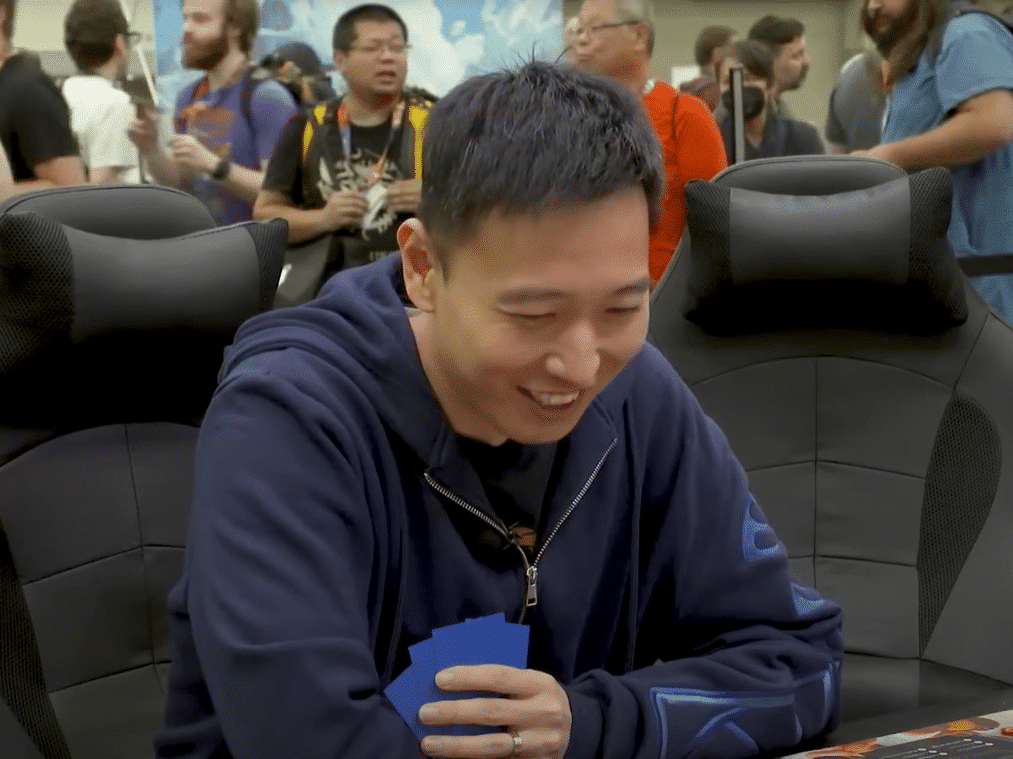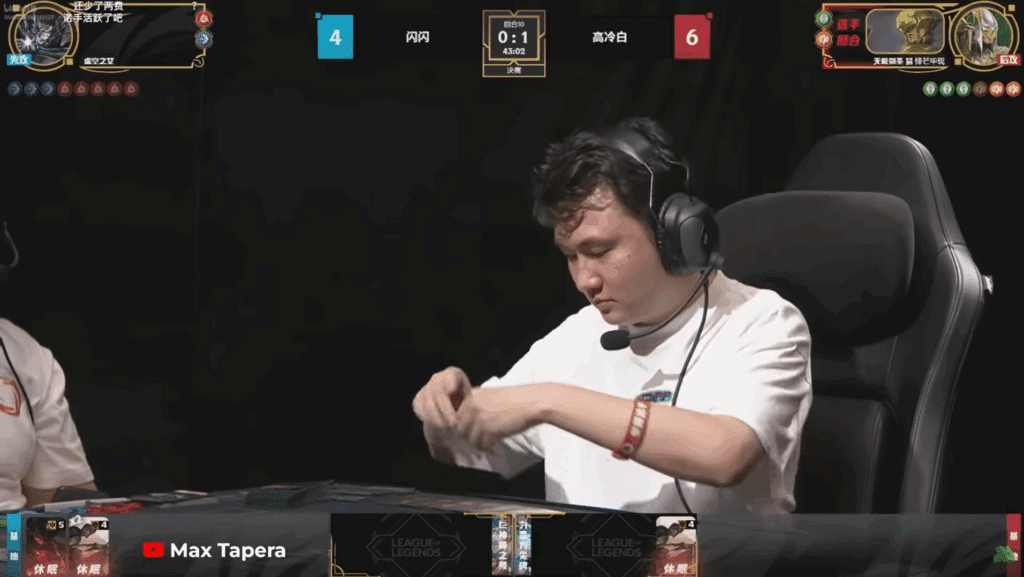
Riftbound, Riot Games’ first foray into the physical trading card game (TCG) sector, will be released globally on October 31st.
First announced in 2024 under the Project K moniker, Riftbound utilises Riot Games’ popular IP, League of Legends, which has previously expanded into the animation and music industries. However, what makes Riftbound different from these endeavours is that it is, at its very core, a competitive game.
As such, Riot Games has also benefited from using another aspect of League of Legends — its esports ecosystem.
Speaking to Esports Insider ahead of the game’s launch, Chengran Chai, Riot Games’ Executive Producer of Riftbound, said: “We know our TCG players are competitors.
“A lot of them play, obviously, socially to have fun, but a lot of them play to win. So that’s why, last year, we debuted the game to the public at the TFT Open in Macau. That was kind of the perfect place to debut, because it was full of big strategy fans.”
Getting Community Feedback
By debuting its product to League of Legends fans at esports events, Chai noted that it provided the Riftbound team with valuable feedback. In particular, he highlighted that the community’s response to the game’s original visual design resulted in Riot Games changing up Riftbound’s look.
He said: “The feedback we got generally was this is a very fun game to play, however, the cards don’t feel League.
“We got help across the company to really just deep dive and rethink through what a League of Legends TCG on paper should feel like. We redid a lot of UI elements. We kept the ones that worked, like the cost and the power. However, we redid a lot, including art. We got new art into set one, and there will be even more new art in set two. That is definitely one piece of feedback we heard loud and clear.”
While League of Legends fans wanted to see new, original art in the game, Chai stated that the Riftbound team still wants to showcase some art that was created through Riot’s other titles.
He added: “We also want to make sure that we’re not just dismissing the art just because League players have seen it.”
Riftbound’s integration into esports has also provided Riot Games with seamless marketing opportunities. This includes creating a League of Legends Worlds 2025 Riftbound bundle and showcasing the TCG to prominent community members such as streamers, esports team owners, or former professional players.
Chai detailed a story in which he met former CLG mid laner Eugene ‘Pobelter’ Park at MSI 2025 in Vancouver and taught him the game at Riftbound’s booth.
“He’s someone who is very into the league ecosystem, and he didn’t even know that Rifbound existed before the demo,” said Chai. “So, I think there’s just also a ton of opportunities for us to bring Riftbound to the broader league fan base.”
Creating a TCG

The TCG industry is becoming an increasingly crowded sector. The ‘big three’ —Pokemon, Yu-Gi-Oh and Magic — are now being joined by rising games such as Lorcana, One Piece, Digimon, Star Wars: Unlimited and many other new TCGs.
So what led Riot Games to enter the scene? According to Chai, it was this very expansion of the TCG ecosystem that gave Riot Games the push it needed.
“We saw a lot of new games coming in and succeeding and really creating their own fan bases that are very sustainable,” stated Chai before later adding: “I think that we saw that and we said, we believe the League IP is also perfect for a TCG.
“With the right execution, with the right partnerships, we too believe that we can create a TCG for many decades to come.”
When asked whether there were any thoughts on creating a holistic Riot Games card game, featuring VALORANT and League of Legends, Chai responded: “We actually debated back and forth earlier on, and I think we quickly reached the conclusion that it’s probably better to stick to just one IP.”
With the project underway and product development complete, Riot Games ultimately opted to launch the game in China earlier in August, prior to its global launch. Riftbound’s Executive Producer explained that the decision behind this was threefold.
Firstly, from a logistical standpoint, all of the factories Riot Games is using to print the cards are located in Asia. This means it takes more time to work on getting a product out of Asia into global markets for a worldwide launch at the same time.
Secondly, the regional launch model allowed Riot Games to identify any issues with the game that could be ironed out prior to its global launch.
Finally, Riftbound wanted to utilise the 2025 League of Legends World Championships and capitalise on the increased audience the event draws.
He explained: “We currently have a very unique opportunity. League of Legends Worlds is being hosted in China right now. Had we waited to launch simultaneously globally, I think we probably could have leveraged Worlds a little bit, but it wouldn’t have been nearly as resonant.”
Competitive Riftbound

At the heart of every TCG is competition, an area that Riot Games is well aware of, given its history in esports.
Whilst Riftbound can be played with up to four players, its competitive scene will initially stick to traditional one-versus-one matches. However, Chai also mentioned the possibility of utilising its two-versus-two mode.
“From a competitive perspective, one-versus-one is going to be the core. I think down the road, we will probably also formalise and introduce two-versus-two, because that is also a competitive format. Free For All [multi-player], we think it’s more social and it’s more fun.”
Whilst the game has not been released worldwide, Riot Games, unsurprisingly, has already put plans in place for its global competitive ecosystem. In July, the company introduced its ‘organised play’ structure, which includes both casual and competitive opportunities following Riftbound’s launch.
Riftbound’s first official English qualifier is set to take place on December 5th in Houston, Texas. Similar to Riot Games’ esports broadcasts, those who cannot watch the event live can tune in to an official broadcast, complete with casters.
Chai noted that one lesson it wants to take from Riot Games’ esports operations is how a competitive TCG broadcast looks from a viewer’s perspective.
This means utilising overlays to make Riftbound easier to follow, as well as other broadcast products that are used at League of Legends and VALORANT esports events. These are already being utilised in China’s official regional qualifiers that are taking place throughout the country.

“We asked our vendor to create a whole new overlay for the game, to explain the board state better. Because one of the biggest challenges of watching a TCG broadcast is you don’t know what is going on unless you know the game really, really well,” said Chai.
He also went on to add: “We had the vendor create a replay system. So after the match ends, casters can go in and can move some cards around on the screen and be like, this is what happened. But had they done this other move, or had they encountered here, there could have been a totally different outcome.
“Now you have a ton of very meaningful content for players to look at and assess, and then think strategically. But then it would also play a big role in terms of filling the 10/15 minutes between games.”
On the flip side, when discussing challenges of organising competitive TCG events compared to esports tournaments, Chai pointed towards the sheer scale of participants that compete at one time.
At the Beijing Riftbound Regional Open alone, Riot Games noted that there were over 500 participants. With more people involved in a TCG event, there is more of an onus to organise participants and the venue layout to ensure that the event runs smoothly.
Chai explained: “For traditional Riot esports, you have a stage and you have two teams come on and you compete, and then there’s just a lot of audience watching… But for TCG, where we have 512 people competing in the Swiss rounds, and in Shanghai, we will have 2048 people competing in round one of the Swiss rounds.
“The sheer number of people and the judges. You need to answer all the questions and ensure that there’s order. As you know, when the next match begins, 2000 people are getting out and then they’re finding new seats. I think that’s something that’s definitely new for us to deal with, especially those of us who haven’t gone to these TCG events before.”
With the first-ever Riftbound World Championship set to debut in 2027, next year will give Riot Games the chance to iron out issues that may arise in competitive play, both from a structural and broadcast perspective.
As Riftbound’s global release date edges ever so closer, only time will tell whether the game will be able to tackle some of TCG’s titans. However, after speaking with Chai, it is safe to say that Riot Games is giving it its best shot.
With a strong brand IP, successes across other expanded industries and experience in providing competitive broadcasts, the signs are there for Riftbound to make an impact in the scene — as long as the game’s mechanics can also shine.
The post “Our players are competitors”: How Riot Games is using esports to push and develop Riftbound appeared first on Esports Insider.






